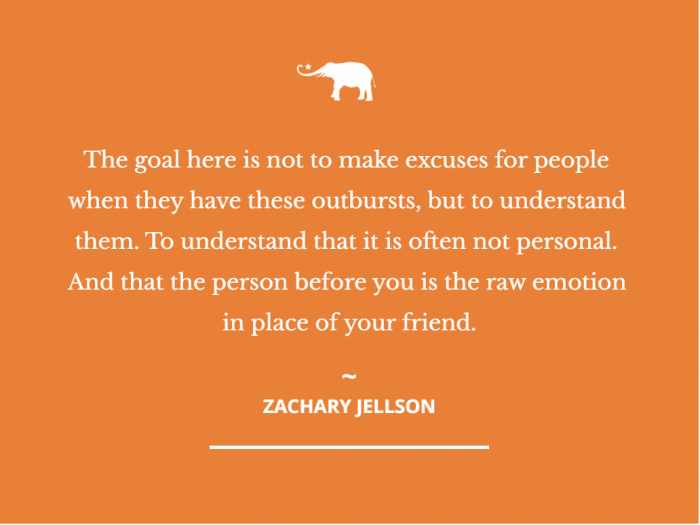All of a sudden it happens; you’re talking to a friend and they lash out.
Their voice changes, their words drip with venom, and they hit you where it hurts. It’s a distinct shift when someone gets in this zone and you can almost watch it build and happen in the moment.
The question is when someone gets like this, do you meet them on the same level, or do you wait until their gas runs out? Before we answer this, I think there are a few things to analyze: first to understand what happens during an argument, and then how to choose your course of action.
Who Am I Talking To?
We know our friends, but when something like this happens, they change, right? Suddenly they are someone we don’t know. You often hear people say “who are you?” when they witness a friend become overtaken with emotion. But that’s what happens: they are “overtaken” by the emotion. Emotions on their own are powerless; they are ideas or concepts. However, we can choose to breathe life into them.
Let’s look at a scenario. Someone bumps into you and spills coffee—there is no emotion. Two objects come into contact, and because one is a liquid, it spills. Now, let’s take the same scenario and add in “anger.” When we choose anger, that occurrence turns into an assault, a personal attack, and requires a response in kind. When this happens, the person standing before us isn’t our friend, but they are “Anger” and the words that are going to come out of their mouth are going to be “Anger’s” words, not your friend’s.
When we can see that process happen and witness the person become overtaken with the emotion, maybe we won’t take the words as personally. Sure, they may still hurt, but we can start to realize that the person before us isn’t the person we know: they are the mouthpiece of an emotion.
Can I See My Friend in There?
I realize this is going to be a bit of a stretch but bear with me for a moment. When you look at the sky, you can see blue stretched across a large expanse. That is what we call sky. Clouds come by and start to hide the sky from us, and we can’t see the blue anymore. Rain clouds come and shower us. But behind it all, there is still blue sky.
So why did I bring up this visual (besides the fact that I love a good metaphor)? A person overtaken with emotion is no different. They are the sky and the clouds are emotions. When emotions start to get in the way, you have to remember that behind those clouds is still a sky, or behind those emotions and words, that person is still there. Rain doesn’t come from the sky; it comes from the clouds. The same is true for an argument. The vicious words come from the emotion, not the person.
The question thus becomes, can I remember my friend is still back there and if so, can I still get a glimpse of them? If you can, then you can still talk to your friend instead of engaging in the emotion. You can still use words to connect with who they really are and help them come back to that state.
Now let’s take this metaphor even further. If you shoot a hose of water up at the rain to make it stop, what would happen? It may hold back a few raindrops on the way up, but it will shower you twofold on the way down. So why fight with the same venom that they are?
When Will This End?
Rain stops eventually—showers don’t last forever. (I promise this metaphor is over now.) The same is true for your friend’s outburst; it will pass. The best course of action may be to just let it pass. Allow them to yell, scream, rant, and rave until they have nothing left to spew. You don’t have to stand there and listen either; you can always leave and let them do this alone. But eventually, it ends. It passes as if nothing happened. When it passes, your friend is still there. Maybe a little scarred or shaky from what just happened—but behind the emotion was your friend all along.
The goal here is not to make excuses for people when they have these outbursts, but to understand them. To understand that it is often not personal. And that the person before you is the raw emotion in place of your friend. The more we start to notice this, the easier it is for us to feel our own emotions taking over. This practice allows us to get distance and avoid a problem before it has time to start. So the next time someone lashes out at you, will you go to war with their emotion or allow it to pass and welcome your friend home?









Read 0 comments and reply